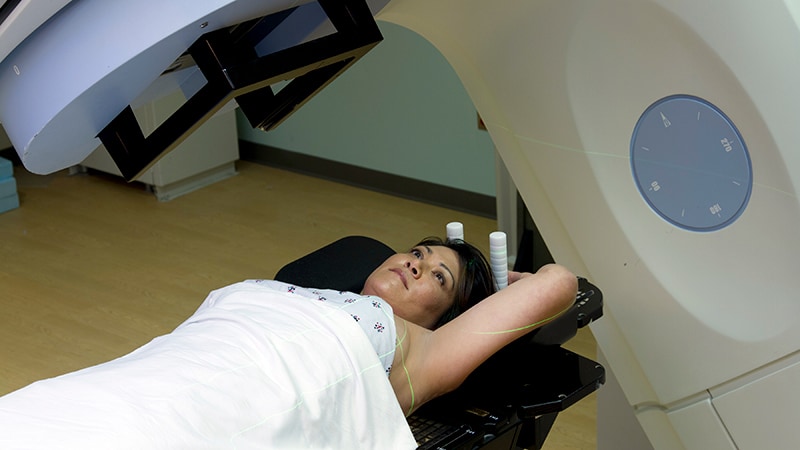Limited Benefit of Regional Nodal Irradiation in Low-Risk Breast Cancer Patients
Core Concepts
Regional nodal irradiation did not improve invasive disease-free survival in low-risk breast cancer patients.
Abstract
TOPLINE:
- RNI did not enhance invasive disease-free survival in low-risk breast cancer patients.
METHODOLOGY:
- Secondary analysis of SWOG S1007 RxPONDER trial with 4871 HR-positive, ERBB2-negative breast cancer patients.
- Patients had 1-3 positive axillary nodes and a recurrence risk score of ≤25 out of 100.
- Initial trial randomly assigned patients to endocrine therapy alone or chemotherapy then endocrine therapy post-surgery.
- Locoregional recurrence rates were assessed with and without RNI over a median follow-up of 6.1 years.
TAKEAWAY:
- Low recurrence rates observed regardless of RNI receipt.
- Invasive disease-free survival did not differ by RNI receipt.
IN PRACTICE:
- Low locoregional recurrence rates observed, and disease-free survival not impacted by RNI receipt.
SOURCE:
- Led by Reshma Jagsi, MD, DPhil, of Emory University, Atlanta, Georgia, published in JAMA Oncology.
LIMITATIONS:
- Observational study with potential confounding by indication.
- Relatively short follow-up period.
DISCLOSURES:
- Funded by the National Cancer Institute and the Susan G. Komen Foundation.
- Investigators reported ties to various pharmaceutical companies.
Customize Summary
Rewrite with AI
Generate Citations
Translate Source
To Another Language
Generate MindMap
from source content
Visit Source
www.medscape.com
Uncertain Benefit of Regional Nodal Irradiation in Low-Risk BC
Stats
"At 5 years, the cumulative incidence of LRR was 0.85% among women who had breast-conserving surgery plus radiotherapy with RNI; 0.55% after breast-conserving surgery with radiotherapy without RNI; 0.11% after mastectomy followed by radiotherapy; and 1.7% after mastectomy without radiotherapy."
"Invasive disease-free survival did not differ by RNI receipt (premenopausal hazard ratio [HR], 1.03; P = .87; postmenopausal HR, 0.85; P = .16)."
Quotes
"The incidence of locoregional recurrence observed in this study was reassuringly low."
"Disease-free survival was not associated with RNI receipt."
Key Insights Distilled From
by M. Alexander... at www.medscape.com 07-07-2023
https://www.medscape.com/viewarticle/994121
Deeper Inquiries
How might the findings of this study impact current treatment guidelines for low-risk breast cancer patients
The findings of this study suggest that regional nodal irradiation (RNI) may not provide significant benefits in terms of invasive disease-free survival for low-risk breast cancer patients. This challenges the current practice of automatically recommending RNI following surgery in this patient population. The study indicates that the incidence of locoregional recurrence was low even without RNI, and disease-free survival was not affected by RNI receipt. Therefore, these results could lead to a reevaluation of the necessity of RNI in low-risk breast cancer patients. Treatment guidelines may need to be updated to reflect the potential lack of benefit from RNI in this specific subgroup of patients, allowing for more personalized and targeted treatment approaches.
What potential biases could have influenced the results of the study, and how could they have been mitigated
One potential bias that could have influenced the results of the study is confounding by indication, as it was an observational study. Patients who received RNI may have had different characteristics or risk factors compared to those who did not, which could have impacted the outcomes. To mitigate this bias, randomized controlled trials could be conducted where patients are randomly assigned to receive RNI or not, ensuring a more balanced distribution of confounding factors. Additionally, adjusting for known confounders through statistical methods and sensitivity analyses can help account for potential biases in observational studies.
How can the concept of disease-free survival being unaffected by RNI receipt be applied to other cancer treatment modalities
The concept of disease-free survival being unaffected by RNI receipt in low-risk breast cancer patients can be applied to other cancer treatment modalities by emphasizing the importance of personalized medicine and tailored treatment approaches. It highlights the need to critically evaluate the benefits of certain treatments in specific patient populations rather than applying a one-size-fits-all approach. By conducting similar studies in other types of cancer and treatment modalities, we can identify subgroups of patients who may not derive significant benefits from certain treatments, leading to more efficient and targeted use of resources. This approach can help optimize patient outcomes while minimizing unnecessary treatments and potential side effects.
0
